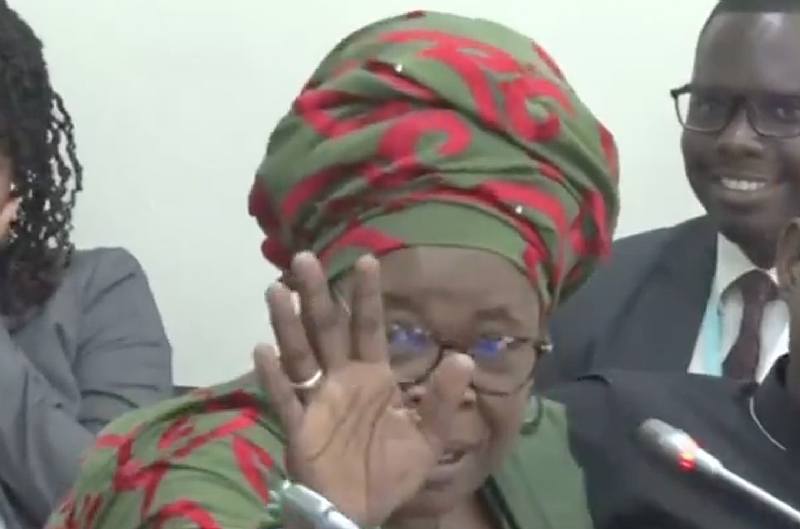Hajia Laadi Ayamba, the Member of Parliament representing the Pusiga constituency, has once again found herself in the social media spotlight, not for her incisive questioning or policy debates, but for her distinctive and now-famous valedictory remark: “Congratulations and bye-bye!” This seemingly innocuous phrase, delivered at the conclusion of the vetting of Lydia Lamisi Akanvariba, the Minister of State-designate for Public Sector Reforms, has become Ayamba’s signature sign-off, endearing her to a growing legion of fans on TikTok and other social media platforms, while simultaneously drawing criticism from those who perceive it as trivializing the gravity of parliamentary proceedings.
Ayamba’s “bye-bye” moment, as it has come to be known, has evolved into a recurring motif in her contributions to the vetting process. During the recent vetting session, as the proceedings drew to a close, Ayamba, true to form, offered her customary farewell, sparking a ripple of amusement among some committee members and igniting a flurry of activity online as social media users eagerly shared the clip. The incident highlights the increasingly blurred lines between formal political discourse and the informal realm of social media, where even seemingly minor occurrences can be amplified and dissected, often with polarized reactions.
The Pusiga MP’s unconventional approach to parliamentary decorum has not been without its detractors. Previous instances of her “bye-bye” sign-off have drawn criticism, with some questioning its appropriateness within the context of the serious deliberations of a parliamentary committee. Critics argue that such informal language undermines the dignity of the vetting process, potentially distracting from the important task of scrutinizing the qualifications and suitability of ministerial nominees. They contend that a more formal and reserved approach is befitting the solemnity of the occasion and the weight of the decisions being made.
However, Ayamba remains unfazed by the criticism, staunchly defending her signature farewell. She maintains that her “bye-bye” is well-intentioned, offering a touch of personal warmth and levity to what can often be a tense and highly formal process. She argues that her approach, far from detracting from the seriousness of the proceedings, humanizes the interaction, making it more relatable and accessible to the public. In her view, a little personal touch can go a long way in fostering a more engaging and less intimidating environment. This perspective reflects a broader debate about the evolving nature of political communication in the age of social media, where informality and personal connection are increasingly valued.
The latest iteration of Ayamba’s “bye-bye” has already begun making its rounds on TikTok, further solidifying her status as an unlikely social media sensation. Her growing fan base on the platform eagerly anticipates her lighthearted farewells, transforming them into viral clips that circulate widely. This phenomenon underscores the power of social media to amplify even seemingly trivial moments, transforming them into cultural touchstones. Ayamba’s “bye-bye,” initially a simple valediction, has now become a meme, a symbol of her distinctive personality and a source of amusement for her online followers.
The contrasting reactions to Ayamba’s signature sign-off—from amusement and appreciation to criticism and disapproval—reflect the ongoing tension between traditional expectations of parliamentary decorum and the evolving dynamics of communication in the digital age. While some view her approach as a refreshing departure from the often-stiff formality of political proceedings, others perceive it as a breach of protocol, a trivialization of important matters of state. Regardless of one’s stance, the “bye-bye” phenomenon highlights the increasing influence of social media on the perception and interpretation of political figures and their actions, turning even the smallest gestures into subjects of public discussion and debate. Ayamba’s case serves as a microcosm of the broader conversation surrounding the intersection of politics, social media, and the evolving norms of public discourse.


